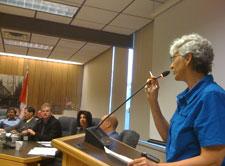The Burnaby school board voted unanimously Jun 23 to strike a committee to address homophobia in its district’s schools.
“I think we can certainly take some pride in it,” said trustee Larry Hayes. “I guess we have to not only talk the talk but walk the walk when it comes to being a progressive school district. We like to see ourselves as very progressive and socially responsible and I think this is taking a big step towards proving that.”
The decision makes Burnaby one of only a handful of school districts in BC to specifically address homophobia.
Of BC’s 60 school districts, only seven have passed comprehensive anti-homophobia policies to date, including the Vancouver and Victoria districts which led the way in 2004, and the Southeast Kootenays and Gulf Islands districts which followed suit in 2006.
As part of the Burnaby board’s decision, which came in the form of an amendment to its policy committee report, an advisory committee will be formed in the 2009/10 school year that includes representation from educational partners as well as LGBTQ groups and allies in the community.
The committee will advise the board on queer issues, develop a specific anti-homophobia policy and form an action plan, according to trustee and policy committee member Tony Coccia.
The amendment represented an about-face by trustees who initially seemed lukewarm to a presentation from two gay Burnaby teachers, Debra Sutherland and James Sanyshyn, asking the board to address homophobia.
With the backing of the Burnaby Teachers’ Association, Sanyshyn and Sutherland had urged the board to consider implementing an action plan to address issues facing queer students in the district.
Coccia said the policy committee, comprised of himself and trustees James Wang and Baljinder Narang, and chair Diana Mumford, had originally decided to simply make district policy more inclusive. But they changed their minds.
“I think it’s the right thing to do. I believe it’s something that I myself reflected on a little bit and realized that we’re advocating for everybody in the district,” said Coccia.
“It’s going to be something that we should be at least listening to what they have to say and at least try and understand the concerns they have about issues and we look forward to working with them.”
“I’m relieved and happy that the board did choose to revisit their original decision to not have a committee, and in fact seemed to unanimously vote to have the committee and the mandate of the committee. I’m relieved and happy and looking forward to getting to work,” said Sutherland, adding that any queer students who want to participate can join the committee.
Gay and Lesbian Educators of BC member James Chamberlain was also pleased with the board’s decision, noting that the Burnaby School District failed to act 10 years ago on the same issue.
“It’s good that they’re moving forward now. It’s unfortunate that they’ve had to be kind of shamed into it by teachers within the district and by students because they have a legal responsibility to make schools safe and to be inclusive of LGTBQ students and their realities,” said Chamberlain.
The next step, said Chamberlain, is to develop a strong action plan.
“We’ve done workshops for teachers interested, but we’re preaching to the converted,” Sutherland noted. “What we’re hoping to get with an action plan here is a systemic way that we get this education addressed to everybody.”
Once teachers really understand the issues, they can incorporate gay realities into the curriculum to help all students feel more included, she said.
Right now, she explained, there are so few positive reflections of gay people in the classroom that gay students internalize homophobia.
With more curriculum inclusion, “gay, lesbian, bisexual, transgender kids won’t feel so isolated or so stigmatized,” she said. “They’ll be more integrated, because we know that if a kid is worried about their identity, they’re not able to focus on school that much. They’re really dealing with the troubling part of what will their friends say, what will their parents say, what will their teachers say? They need to get more support all the way along.”
While some previous attempts to incorporate gay realities into classrooms and reading materials have met with opposition in some school districts, Sutherland doesn’t think that will be the case this time.
“We’ve been integrating the issues there [at Burnaby North] with very little complaint,” she noted. “There will likely be some resistance in elementary from some people at some point but again, how we combat that is through education, with the facts. So no, I don’t think there’ll be any backlash at all in Burnaby.”

 Why you can trust Xtra
Why you can trust Xtra


